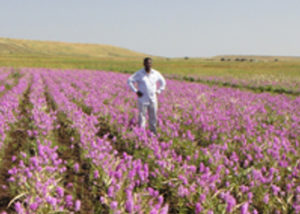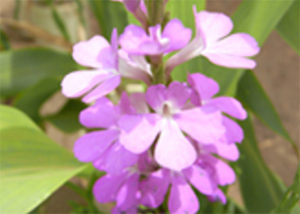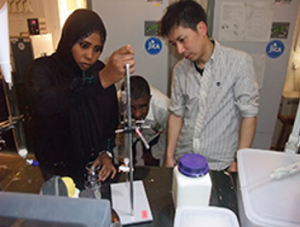#Striga #Witchweed #Parasitic weeds
Project Summary
Get back the food being robbed from us by Striga, known as witchweed, and create an Africa that can win the battle against root parasitic weeds!
Sudan has vast areas of potential cropland, but the development of these may be futile until it finds an effective solution against parasitic weeds. The country has been suffering from the devastating effects of root parasitic weeds of the genus Striga, commonly known as witchweeds. These parasites are widespread in the arid and semi-arid regions in Africa. They invade economically important food crops, sapping them of nutrients and water and thus causing serious losses specifically in grain yields.
To tackle this problem, Kobe University implemented “Improvement of Food Security in Semi-arid Regions of Sudan Through Management of Root Parasitic Weeds, Managing Striga (Witchweed) Project (2009-2014)” in collaboration with Sudan University of Science and Technology (SUST) under SATREPS※, the research programme supported by Japan Science and Technology Agency (JST) and Japan International Cooperation Agency (JICA). The aim of the project was to (i) identify novel compounds or microorganisms capable of modulating Striga germination, (ii) develop effective management strategies, and (iii) introduce crops resistant to the parasites.
To further develop the achievement of the project, Kobe University and National Center for Research (NCR) started an advanced project, “Developing Countermeasures Against Striga to Conquer Poverty and Improve Food Security Project” in 2016 under the same SATREPS programme.
※For more information on SATREPS, please check here.
Project Details
What Is Striga hermonthica?
Striga is called witchweed because it blooms with beautiful purple flowers, yet it brings massive harm to agricultural crops.
Striga hermonthica, commonly known as the giant witchweed of Africa, is a plant which blooms with beautiful purple flowers, attaches itself to sorghum and millet (the main staples of the people of Sudan), and draws out all nutrients of the host plants until they wither and die. The seeds of Striga are extremely tiny and can survive for decades in soil until a host plant that they can invade grows in the vicinity. So it is impossible to eliminate them all, or wait for them to simply disappear.
The damages that Striga cause can extend to an area twice the size of mainland Japan, resulting in agricultural losses of hundreds of billions to one trillion yen. Sudan, which does not have a strong economy, is unable to implement large-scale countermeasures against this problem. The parasite led many households to abandon their Striga-infested land and migrate to cities where they live a marginal life.
To deal with enormous damage to crops in arid regions caused by Striga, it is necessary to come up with countermeasures that are inexpensive, adapted to the Sudanese culture, and easy for the farmers to implement.
Project Details
(1) Improvement of Food Security in Semi-arid Regions of Sudan Through Management of Root Parasitic Weeds, Managing Striga (Witchweed) Project (2009-2014)
Japanese researchers from Kobe University, in collaboration with Sudanese scientists, developed substances that induce self-destruction in Striga. They also conducted a research on reducing damage by appropriate water management. In addition to these, they implemented Farmers Field Schools for local inhabitants to enable the transfer of available Striga management technologies. They believed that new findings and techniques could become truly meaningful when these would be actually adopted by the local farmers.
The three initiatives that the researchers/scientists took to win the battle against Striga.
(2) Developing Countermeasures Against Striga to Conquer Poverty and Improve Food Security Project (2016-2021)
-
Source: https://www.jst.go.jp/global/english/kadai/h2807_sudan.html
Isolating a component of Striga
-
Source: https://www.jst.go.jp/global/english/kadai/h2807_sudan.html
Controlling Striga by inducing suicidal germination
In the second phase, there are two main research pillars:
①Analysis of root parasitic weeds from a chemical perspective to provide information that facilitate development of an integrated management strategy
This project aims to elucidate Striga’s germination mechanism to develop a management strategy for use in Sudan where people are suffering from the devastating damage caused by Striga. The researchers will also engage in the selection of resistant species, and search for useful substances produced by Striga to utilise these as biological resources.
The findings of the project will be shared with local farmers to establish an effective integrated management strategy.
②Increase of food production through parasitic weed control and creation of a new biological resource
A germination inducer will promote the growth of Striga seeds in fields without any host species present, while resistant crop species will reduce the proliferation of the parasite. The Striga plants that survive will be utilised as raw material for extracting useful substances. This integrated strategy can be applied to manage other root parasitic weeds in the fight to overcome biotic constraints to global food production.
Thanks to the initiatives of Japanese and Sudanese researchers, the day we win the fight against Striga may be coming in the near future!
For more information, check out the official website.
・Improvement of Food Security in Semi-arid Regions of Sudan Through Management of Root Parasitic Weeds
・Developing Countermeasures Against Striga to Conquer Poverty and Improve Food Security
・SATREPS Project Case Study, Striking Out Against Striga called Witchweed!
The information contained in this article was written by AI-CD Secretariat based on information which is publicly available without consent of each source for the purpose of introducing Japan’s cooperation. AI-CD Secretariat does not guarantee that there will be no errors in the contents of this article, and disclaims any liability for errors and omissions or for any damages accruing from the use of this article. The article also includes contents, links, other information, and translated material provided by third-parties for which AI-CD Secretariat claims no responsibility.
Written by Ayaha MOCHIZUKI,
AI-CD Secretariat Support Team








